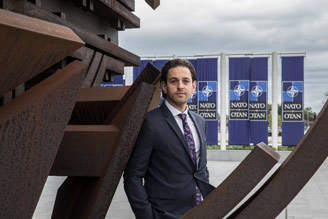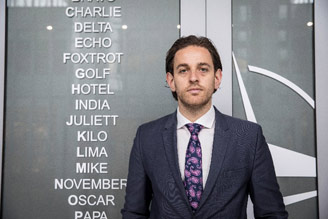Meet Dan Black, a cyber analyst protecting NATO networks against cyber threats
Dan Black is a senior analyst at NATO Headquarters, at NATO’s Emerging Security Challenges Division. This Canadian citizen deals with current and future security issues.

“It is my job to act like a cyber detective to uncover the fingerprints, piece them together, and re-trace the malicious activity looking for patterns that could help identify and prevent similar malicious activity in the future,” explains Dan.
NATO relies on resilient communications and information systems, or ‘networks’, to carry out its work. An isolated threat against one single computer or network has the potential to have follow-on effects on other similar or connected systems, and sometimes with more severe consequences.
“For instance, a single computer successfully targeted by a cyber threat could have the potential to jeopardise sensitive information, put troops in harm’s way, or disrupt societal systems such as hospitals, energy grids, or even the technology that makes an election run smoothly,” describes Dan.
With multiple new cyber threats being reported on a daily basis, Dan takes stock of all the events, and figures out what risk NATO is exposed to and how to mitigate this risk. “So as a potential new threat emerges, we try to collect as much information as possible to rapidly understand what unforeseen secondary effects that particular cyber threat could have, and how those effects could impact NATO and its Allies”.
Dan works with his colleagues across NATO – at the Headquarters, in specialised agencies and in the military commands – to piece together the information. He further shares this analysis with all 30 NATO Allies, so they can benefit from NATO’s analysis in their own cyber defence efforts.
Fighting against disinformation
Another aspect of Dan’s job is to contribute to combat disinformation enterprises by third parties. Such activities manipulate facts or inject falsehoods into mainstream media or social media, where people commonly seek their information. Disinformation campaigns against NATO and its Allies aim to undermine public opinion about NATO and attempt to divide the Alliance.
“This can take many forms, such as reducing public support for a NATO policy or mission, attempting to pitch Allies against one another, or promoting anti-NATO sentiments,” describes Dan.

To fight against disinformation activities, Dan proactively identifies campaigns, and the tactics, techniques and procedures used by malicious actors, before they reach a large audience. “Just like cyber threats, disinformation is largely delivered digitally.
This means that the same types of evidence used to track malicious cyber activity can also be used to help track disinformation campaigns, better understand how they are operated, and assess what they are intended to achieve’” says Dan.
This information is then provided to other NATO divisions and all Allies to carry out their respective disinformation response efforts.
Being prepared
Apart from his daily activities, Dan also ensures NATO stays prepared to tackle future threats. “I conduct in-depth research into cyber threat groups in order to understand their long-term motives, changes in their tactics, and what their patterns of activity might tell us about understanding future threats better,” explains Dan.
Dan works closely with experts from NATO Allies and with partners, including the European Union, as well as industry to enhance their common understanding and response to new and emerging threats.
“NATO is an invaluable platform for developing strong, trusted partnerships that can engage and connect stakeholders and stimulate the cooperation necessary to enhance our collective cyber defence,” remarks Dan.
A former professional video gamer
Dan enjoys every bit of his job.Working as a cyber threat analyst puts him directly on the front lines of protecting NATO’s information. “There is nothing more rewarding than being able to see your contributions actively shape how NATO responds to current and future threats,” says Dan.

This former professional video gamer grew up playing all kinds of video games with his brothers. He competed in international video game tournaments around the world, and on multiple occasions, he even had the privilege to represent Canada on the international stage.
From these experiences, Dan grew his interest in international affairs, and later in NATO.
“My family sees cyber events continuing to make headline news and has developed a strong appreciation of how important my work in cyber is as a part of defending the collective values of freedom and democracy”.
When asked what he studied in school to get into this field, he answers that he studied archaeology. “You don’t have to have a deep technical background to be a good cyber analyst. Being curious and analytical are the two most important pieces, the rest can be learned,” concludes Dan.
